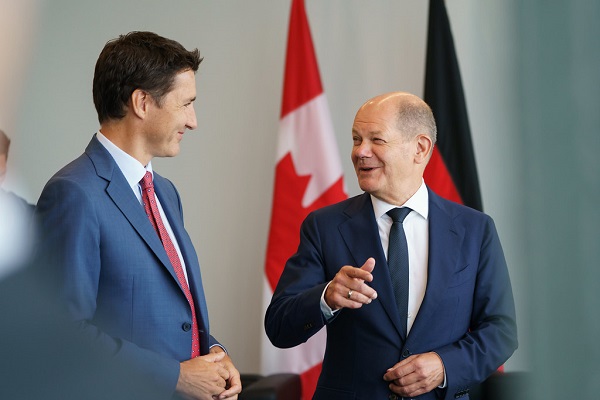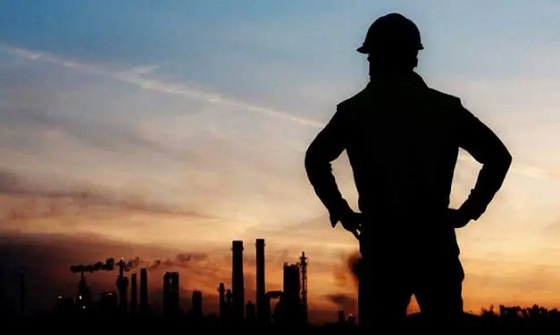Energy
Canadian hydrogen is not a silver bullet for Germany’s energy needs

From Resource Works
Germany bet big on hydrogen, an infant technology in terms of commercial viability. Canada also jumped on the hydrogen train at a time when they should have been doubling down on LNG exports, a resource Canada has in abundance
Canada and Germany had, and probably still have, such mighty ambitions for their hydrogen. Lauded as a can’t-miss step in the journey towards a clean energy utopia that would position Canada as a world leader in hydrogen, it is now cracking before it even really gets underway.
The goal of the deal was a good one. Germany wanted to reduce its reliance on vast amounts of Russian gas following the invasion of Ukraine in 2022. However, the nonstop delays and challenges of realizing a Canada-Germany hydrogen deal have exposed the folly of going all in on a non-developed energy source at the cost of an existing one. These problems make it very clear that both Canada and Germany have miscalculated by placing all their eggs in one basket for a long-term goal, instead of turning to alternatives like liquefied natural gas (LNG) in the short term.
The federal government announced that there was no “business case” for exporting LNG to Europe at the time.
Hydrogen has a good future as a clean, renewable source of energy, and that is undeniable. It is not going to happen overnight as it will require large-scale facilities for production and distribution, especially for green hydrogen. Canada and Germany signed their hydrogen agreement in 2022, aimed at jumpstarting Canadian hydrogen exports by 2025.
We are now sitting at the end of 2024, and the necessary infrastructure is not close to being completed. Facilities in Atlantic Canada intended to help supply the hydrogen are still in their planning stages, while German investment is falling behind.
As far as logistics go, hydrogen presents a huge challenge. To produce hydrogen, massive amounts of energy are needed, and the plan to use wind energy to power these facilities is very impractical. Hydrogen also must be converted into ammonia for shipment, which is another energy-intensive and expensive process. When ammonia does theoretically reach Germany, up to 80 percent of the original energy load is expected to have been lost. If such a loss could be captured in a photo, it could slot into the dictionary for the word “inefficient.”
Germany needs energy security given its divorce from Russian gas, and this demanded a far more immediate response in 2022. Rather than diversifying energy imports and turning to short-term solutions like Canadian LNG, Germany bet big on hydrogen, an infant technology in terms of commercial viability. Canada also jumped on the hydrogen train at a time when they should have been doubling down on LNG exports, a resource Canada has in abundance, and which, like most fossil fuels, can be stored and shipped with speed and efficiency.
While hydrogen has a future, refusing to embrace LNG as an export to Europe was a mistake when responding to Europe’s energy crisis. Both the United States and Qatar secured long-term contracts for LNG exports to Europe, while Canada has been absent from the table. Germany itself invested heavily in floating LNG terminals, highlighting how natural gas will remain a vital part of the European energy mix for years to come.
There is great irony in the fact that natural gas, while still emitting more than hydrogen, produces far fewer emissions than coal, which many European states have been forced to turn to in the wake of energy shortfalls. Germany is one of the world’s most prolific consumers of coal, and that has only intensified with the cutoff of Russian gas, undermining its ambitious climate goals. Canadian LNG should have played a greater role while hydrogen infrastructure was constructed in Canada, and investment capital was raised in Germany.
What the ongoing delays and inefficiencies in the Canada-Germany hydrogen deal demonstrate is a cautionary tale. While hydrogen has a key role to play in the future of global energy, it is not a silver bullet in the short term.
Energy
Canada’s oilpatch shows strength amid global oil shakeup

This article supplied by Troy Media.
Global oil markets are stumbling under too much supply and too little demand but Canada’s energy sector is managing to hold its own
Oil prices are sliding under the weight of global oversupply and weakening demand, but Canada’s oilpatch is holding steady—perhaps even thriving—as others flounder.
Crude is piling up in tankers, major producers are flooding the system, and demand is fading fast. According to a Windward report cited by Oilprice.com, the amount of oil held in floating storage—tankers sitting offshore waiting for buyers —has hit record highs. Sanctions on Russian and Iranian crude have sidelined entire fleets. Meanwhile, Middle East cargoes continue to pour in, keeping global supply bloated.
Gunvor CEO Torbjorn Tornqvist called the scale “unprecedented,” warning the market would be flooded overnight if sanctions against Russian and Iran were lifted.
And there’s more coming. U.S. crude production has hit a new record of 13.8 million barrels per day in August. And China’s Changqing oilfield just surpassed 20 million tonnes in cumulative output, and national totals have topped 400 million tonnes of oil equivalent this year. More barrels. More pressure. Less price support.
At the same time, demand is slipping. U.S. gasoline use is down. Global shipping activity has slowed. JPMorgan just trimmed its 2025 oil demand forecast by 300,000 barrels per day. China’s manufacturing sector shrank for the seventh month in a row.
Japan’s purchasing index dropped to an 18-month low. And recession fears are back in the headlines.
OPEC+ tried to calm the chaos by announcing a modest increase in output this December, with a pause on future hikes. But the move didn’t move markets. Then Saudi Arabia cut its selling prices to Asia, a clear signal that the kingdom sees weak demand ahead.
In short, it’s messy out there. But not everywhere.
Amid this global downturn, Canada’s energy sector stands out for one rare quality: resilience. While other producers are scaling back or scrambling to adapt, Canada’s oilpatch is quietly outperforming.
A recent CBC News report highlighted the sector’s staying power and why it’s better positioned than its U.S. counterparts. “The companies that have survived here are the companies that have been able to adapt,” said Patrick O’Rourke, managing director at ATB Capital Markets. “It’s effectively Darwinism.”
It’s also smart design. Canada’s oilsands—primarily in Alberta—are expensive to build but cheap to run. Once the upfront costs are covered, producers can keep pumping for decades with relatively low reinvestment. That means even in a
downturn, output stays strong.
Dane Gregoris of Enverus says Canada’s conventional sector is holding up better than the U.S. shale patch. Why? Canadian oil producers operate more efficiently, with fewer legal and logistical barriers tied to land access and ownership than their U.S. shale counterparts. They also benefit from lower operating costs and are less dependent on relentless drilling just to maintain output.
And now, they finally have a way to get more oil out.
The long-delayed Trans Mountain pipeline expansion is finally complete. It delivers Alberta crude to B.C.’s tidewater and, from there, to Asian markets. That access, once a significant limitation for Canadian producers, is now a strategic advantage. It’s already helping offset lower global prices.
Canada’s energy sector also benefits from long-life assets, slow decline rates and political stability. We have a reputation for responsible regulation, but that same system can slow development and limit how quickly we respond to shifting global demand. We can offer a stable, secure supply but only if infrastructure and regulatory hurdles don’t block access to it.
And for Canadians, that matters. Oil prices don’t just fuel industry headlines; they shape provincial and national budgets, drive investment and underpin jobs across the country. Most producers around the world are bracing for pain but Canada may be bracing for opportunity to expand its presence in Asian markets, secure long-term export contracts and position itself as a reliable supplier in a turbulent global landscape.
None of this means Canada is immune. If demand collapses or sanctions lift, prices could sink further. But in a volatile global landscape, Canada isn’t scrambling—it’s competing.
While others slash forecasts, shut wells or hope for an OPEC rescue, Canada’s energy producers are doing something rare in today’s oil market: holding the line.
Toronto-based Rashid Husain Syed is a highly regarded analyst specializing in energy and politics, particularly in the Middle East. In addition to his contributions to local and international newspapers, Rashid frequently lends his expertise as a speaker at global conferences. Organizations such as the Department of Energy in Washington and the International Energy Agency in Paris have sought his insights on global energy matters.
Troy Media empowers Canadian community news outlets by providing independent, insightful analysis and commentary. Our mission is to support local media in helping Canadians stay informed and engaged by delivering reliable content that strengthens community connections and deepens understanding across the country
Alberta
How economic corridors could shape a stronger Canadian future

Ship containers are stacked at the Panama Canal Balboa port in Panama City, Saturday, Sept. 20, 2025. The Panama Canals is one of the most significant trade infrastructure projects ever built. CP Images photo
From the Canadian Energy Centre
Q&A with Gary Mar, CEO of the Canada West Foundation
Building a stronger Canadian economy depends as much on how we move goods as on what we produce.
Gary Mar, CEO of the Canada West Foundation, says economic corridors — the networks that connect producers, ports and markets — are central to the nation-building projects Canada hopes to realize.
He spoke with CEC about how these corridors work and what needs to change to make more of them a reality.
CEC: What is an economic corridor, and how does it function?
Gary Mar: An economic corridor is a major artery connecting economic actors within a larger system.
Consider the road, rail and pipeline infrastructure connecting B.C. to the rest of Western Canada. This infrastructure is an important economic corridor facilitating the movement of goods, services and people within the country, but it’s also part of the economic corridor connecting western producers and Asian markets.
Economic corridors primarily consist of physical infrastructure and often combine different modes of transportation and facilities to assist the movement of many kinds of goods.
They also include social infrastructure such as policies that facilitate the easy movement of goods like trade agreements and standardized truck weights.
The fundamental purpose of an economic corridor is to make it easier to transport goods. Ultimately, if you can’t move it, you can’t sell it. And if you can’t sell it, you can’t grow your economy.
CEC: Which resources make the strongest case for transport through economic corridors, and why?
Gary Mar: Economic corridors usually move many different types of goods.
Bulk commodities are particularly dependent on economic corridors because of the large volumes that need to be transported.
Some of Canada’s most valuable commodities include oil and gas, agricultural commodities such as wheat and canola, and minerals such as potash.
CEC: How are the benefits of an economic corridor measured?
Gary Mar: The benefits of economic corridors are often measured via trade flows.
For example, the upcoming Roberts Bank Terminal 2 in the Port of Vancouver will increase container trade capacity on Canada’s west coast by more than 30 per cent, enabling the trade of $100 billion in goods annually, primarily to Asian markets.
Corridors can also help make Canadian goods more competitive, increasing profits and market share across numerous industries. Corridors can also decrease the costs of imported goods for Canadian consumers.
For example, after the completion of the Trans Mountain Expansion in May 2024 the price differential between Western Canada Select and West Texas Intermediate narrowed by about US$8 per barrel in part due to increased competition for Canadian oil.
This boosted total industry profits by about 10 per cent, and increased corporate tax revenues to provincial and federal governments by about $3 billion in the pipeline’s first year of operation.
CEC: Where are the most successful examples of these around the world?
Gary Mar: That depends how you define success. The economic corridors transporting the highest value of goods are those used by global superpowers, such as the NAFTA highway that facilitates trade across Canada, the United States and Mexico.
The Suez and Panama canals are two of the most significant trade infrastructure projects ever built, facilitating 12 per cent and five per cent of global trade, respectively. Their success is based on their unique geography.
Canada’s Asia-Pacific Gateway, a coordinated system of ports, rail lines, roads, and border crossings, primarily in B.C., was a highly successful initiative that contributed to a 48 per cent increase in merchandise trade with Asia from $44 million in 2006 to $65 million in 2015.
China’s Belt and Road initiative to develop trade infrastructure in other countries is already transforming global trade. But the project is as much about extending Chinese influence as it is about delivering economic returns.

Piles of coal awaiting export and gantry cranes used to load and unload containers onto and from cargo ships are seen at Deltaport, in Tsawwassen, B.C., on Monday, September 9, 2024. CP Images photo
CEC: What would need to change in Canada in terms of legislation or regulation to make more economic corridors a reality?
Gary Mar: A major regulatory component of economic corridors is eliminating trade barriers.
The federal Free Trade and Labour Mobility in Canada Act is a good start, but more needs to be done at the provincial level to facilitate more internal trade.
Other barriers require coordinated regulatory action, such as harmonizing weight restrictions and road bans to streamline trucking.
By taking a systems-level perspective – convening a national forum where Canadian governments consistently engage on supply chains and trade corridors – we can identify bottlenecks and friction points in our existing transportation networks, and which investments would deliver the greatest return on investment.
-

 Daily Caller2 days ago
Daily Caller2 days agoLaura Ingraham’s Viral Clash With Trump Prompts Her To Tell Real Reasons China Sends Students To US
-

 Frontier Centre for Public Policy2 days ago
Frontier Centre for Public Policy2 days agoRichmond Mayor Warns Property Owners That The Cowichan Case Puts Their Titles At Risk
-

 Business2 days ago
Business2 days agoSluggish homebuilding will have far-reaching effects on Canada’s economy
-

 Business2 days ago
Business2 days agoMark Carney Seeks to Replace Fiscal Watchdog with Loyal Lapdog
-

 Business6 hours ago
Business6 hours agoParliamentary Budget Officer begs Carney to cut back on spending
-

 Censorship Industrial Complex22 hours ago
Censorship Industrial Complex22 hours agoEU’s “Democracy Shield” Centralizes Control Over Online Speech
-

 Addictions7 hours ago
Addictions7 hours agoCanadian gov’t not stopping drug injection sites from being set up near schools, daycares
-

 International24 hours ago
International24 hours agoIs America drifting toward civil war? Joe Rogan thinks so












